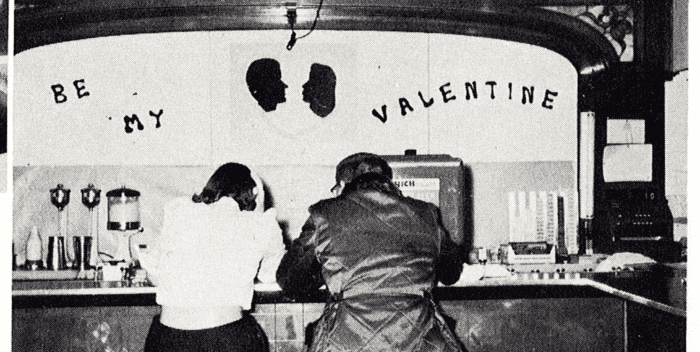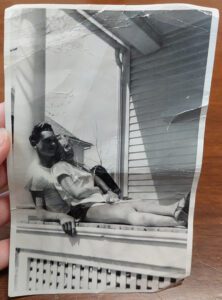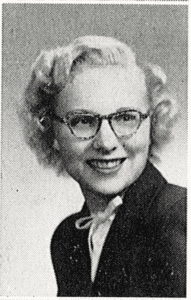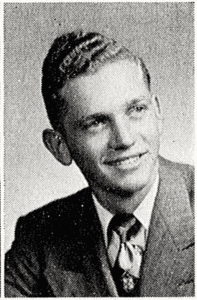Love on campus: Courtship at Concordia in the 1950s
A couple sits at the Snack Bar in Founders Hall in 1953, which is decorated for Valentine’s Day.
Photo credit: 1953 “Golden Embers” yearbook
By Nora Betts
Dr. Elden Duensing, 92, reached into his shirt pocket and pulled out two black-and-white photographs, one of a young couple lounging on the porch of Concordia’s former Dorm J. The date written on the back was 1950.
“These sure are wrinkled,” said Duensing’s wife, Glendora, 92. “Did you keep these next to your heart?”
“Yup.”
The Duensings met, fell in love, and dated at Concordia from 1949 to 1953, where they said courtship looked different than college romance does today. They have been married for over 70 years and have four children.
A Concordia Love Story
Elden “Jack” Duensing and Glendora “Glennie” Sorenson met in 1949, their freshman year at Concordia Teacher’s College when all students earned education degrees. There were 259 students at Concordia in 1953, split almost evenly between men and women.
Jack and Glennie said everyone on campus had an eye out for a significant other.
“If we were here, we were probably looking (for a boyfriend or girlfriend),” said Jack. “If you didn’t have one or the other, you really worked at it.”
Jack said that his and Glennie’s “eyes met” for the first time in class. Glennie said she had to walk by him every day since their desks were arranged alphabetically.
“All the classes, everybody sat alphabetically,” said Glennie. “He was a ‘D’ and sat toward the front and I was an ‘S’ so I had to go to the back. And I had to walk by him.”
When Jack called to ask Glennie on a date, he had to go through a campus telephone operator who would connect the caller to the receiver. Glennie said she did not know Jack’s name before he asked her out.
“He called me on the phone and asked [the operator] for my name,” said Glennie. “He says, ‘I’m Elden Duensing.’ I didn’t know an Elden Duensing! When I answered the phone, I said ‘Who is this?’ I didn’t know his name at all and here he was calling for a date!”
The couple went to see a movie at the Rivoli Theatre in downtown Seward, beginning their dating relationship that would last throughout college.
Glennie said she did not get a 4-year degree from Concordia, but instead took a teaching assignment at least a year before Jack’s graduation in 1953. According to Concordia’s archivist, Jerry Pfabe, it is likely that Glennie went through a 3-year program to earn her Lutheran Teacher Diploma instead of a Bachelor of Science in Education like Jack.
Glennie’s first teaching assignment took her to Hastings, Nebraska, which today is a 1.5-hour drive southwest of Seward. Jack said he hitchhiked to see Glennie and did not let the distance keep them apart, even though neither of them had a car.
Jack graduated in 1953 and he and Glennie were married on June 28 of that year. Jack said they were one of five college couples married at St. John Lutheran Church on the same day.
Dating Restrictions
Jack said that the “campus was filled with couples” but the students had to follow strict guidelines in their relationships.
Glennie said most Concordia students were dating “but we weren’t touching– couldn’t hold hands.”
According to Jack, he and Glennie were made an example in a chapel message after being seen together on the porch of Glennie’s dorm. He said the man who lived next door to Dorm J was a faculty member who reprimanded the couple for touching because Concordia forbade public displays of affection betwen students who were dating.
“We made the chapel address here on campus by the guy who lived there,” Jack said. “In the chapel service, he said to the whole student body, ‘We have this couple who lives near us in this house and they all sit on the porch and they do things my wife and I don’t do.’”
The 1958-1959 edition of Concordia’s student handbook gave one iteration of the expectations for relationships, especially about behavior in the campus center and student lounges.
The handbook stated: “Students are expected at all times to live up to the highest standards of Christian conduct in boy-girl relationships, and to avoid the misuse in this respect of the Student Center as well as other places on campus.”
Glennie said she remembered the dean of students making his rounds through the campus center and student lounges to make sure couples were behaving appropriately.
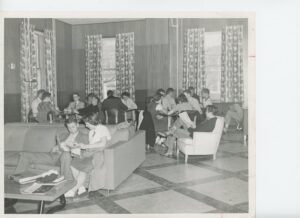
Students hang out in the student lounge in Founders’ Hall in the 1950s. Credit: Jerry Pfabe, Concordia archive
“The Dean of Men, you never knew when he was coming to inspect,” Glennie said. She said that whenever they heard him walking down the hall, “Everybody scattered!” Glennie said they never got into any trouble, but “we had fun, though, dodging him.”
Jack said he remembered only a few students getting married while still in college. According to the 1952-1953 student handbook, the Concordia faculty and administration were involved in the engagement process.
A man seeking to get engaged should consult with his adviser and the dean of students before proposing to his girlfriend, the handbook said. He also needed to “provide the dean with parental consent in writing.” Furthermore, he needed to show that he was “financially able to support a wife within a year after becoming engaged to be married” if he was not about to graduate.
Curfews
Students at Concordia were required to sign out of a “housebook” at their dorm when they left campus during designated hours, which varied between men and women, according to the handbook. Students signing out had to disclose where they were going, with whom they were going, when they were leaving, and when they intended to return.
Overall, men were allowed to stay out later than women and only needed to sign out if they left after 7:30 p.m. Freshman and sophomore men had to be in their dorms by 7:30 p.m. on weekdays and 11 p.m. on weekends. Junior and senior men had to be back by 11 p.m. on weekdays but had no curfew on weekends.
Women needed to sign out if they left campus at any time during the day, and needed to be in their dorms by 7:30 p.m. each weekday. All women had to be back by 10:30 on Sunday nights but could stay out until 11 or 11:30 on Fridays and Saturdays, depending on their grade level.
Glennie said she and her dormmates were required to attend a short devotion at 8 p.m. on weekdays. After the devotion, “we were dismissed to our rooms and we had to study ‘til 10 and then lights out,” said Glennie.
Visitors of the opposite sex were allowed in “dormitory reception rooms” only on weekends between 5:15 p.m. and 8 p.m., according to the student handbook.
Dating in the 50s
Jack and Glennie said that since there were so many couples on campus, they enjoyed many group dates during their time at Concordia.
“It was just a great campus to live on,” said Jack. “It was just fantastic, especially if you were with others who were dating. And then, of course, we would get together, and we’d eat out, and we’d go to the movies together, and we’d do so much dating together.”
According to Glennie, “One meeting place was the Snack Bar.”
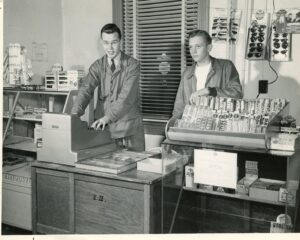
The Snack Bar in the basement of Founders’ Hall was a popular spot on campus. Jack (right) worked at the Snack Bar for several years. Credit: Jerry Pfabe, Concordia archive
The Snack Bar, located in the basement of Founders Hall, served as a popular date spot on campus. Concordia’s 1953 yearbook, the Golden Embers, states, “The best evidence of Valentine’s Day was in the Snack Bar, both the decorations and the couples.”
Couples also went to the Rivoli Theatre downtown and Concordia football games held at the present-day fairgrounds, Glennie said. She said she enjoyed going to football games despite the long walk because then she and Jack could hold hands.
Advice from Jack and Glennie
Jack and Glennie said they look back fondly on their time at Concordia and encourage current college couples to enjoy the experience.
“I’d say enjoy the life here. We really did,” said Jack. “Mostly just enjoy the relationship in this fantastic place.”
For single people on campus, Jack said Concordia is a great place to find a significant other. He said college students at Concordia have a lot in common with each other, both when he was a student and today.
“If you don’t have a boyfriend or girlfriend, a good place to look is in the student body here because you have so much in common,” said Jack. “All of us would be the same when you look back at us.”
Student Life Today
Director of Student Life Rebekah Freed said that guidelines in the 1950s and the 2020s were both designed to foster healthy, Christian relationships.
“A lot of our guidelines are just around wanting people to have healthy relationships and doing that in a way that aligns with God’s Word,” said Freed. “I think that was their intent back then, too.”
Freed said that college is a natural time to pursue relationships, romantic or otherwise, and that many Concordia students are looking for spouses.
“I think in general, it’s a time of life when students are looking for all kinds of relationships, and romantic relationships are one of them,” said Freed. “I think it’s a very natural thing just developmentally and culturally that there are still plenty of students where that is a focus.”
Freed said that the 2023-2024 student handbook does not have many guidelines relating specifically to romantic relationships. She said that things like visitation hours in dorms were designed for the privacy and protection of students, not necessarily as guidelines for couples.
“The visitations hour though, at least now, are actually less about any kind of relationships or guidelines around that,” she said. “Really what it’s more about than anything is privacy and protection and having spaces and times when people can know they can walk out on their dorm floor and go to the bathroom and the opposite gender just won’t be there.”
Freed said the Student Life Office, led by her and Gene Brooks, the vice president of student affairs, handles what the Dean of Students did in the 1950s.
“Dean of students– now the language for that would be vice president for student affairs,” Freed said. “Our office as a whole manages off-campus requests and if there were any issues that came up with visitation, things like that.”
The Duensings’ Life Since 1953
In Jack and Glennie’s 70 years of marriage, they lived in three different states but ultimately ended up back in Seward.
Immediately after Jack and Glennie got married in June 1953, Jack took a call to a teaching position in Twin Falls, Idaho.
“When we were finished with marriage and the celebration of it, we got in the car and started driving to Idaho,” he said.
Jack and Glennie spent three years in Idaho and had two children, and then Jack got a call to Providence, Rhode Island. They spent six years there had two more children, and then returned to Seward in 1962 when Jack was called to work at Concordia.
Jack served Concordia from 1962 to 1993. He said he did some teaching in the education department but spent most of his time in the Concordia administration and recruitment offices.
Jack said he and Glennie and their college friends stayed connected over the years as they took teaching positions in various places.
“We all became close friends and, of course, most of us ended up as teachers across the United States,” said Jack. “So we would visit each other and that kept on going all our life.”
Jack said Concordia had a profound impact on his life, from meeting his future wife to making life-long friendships to serving as a teacher for 31 years.
“We called it a Concordia family and that’s exactly what it was,” said Jack.


